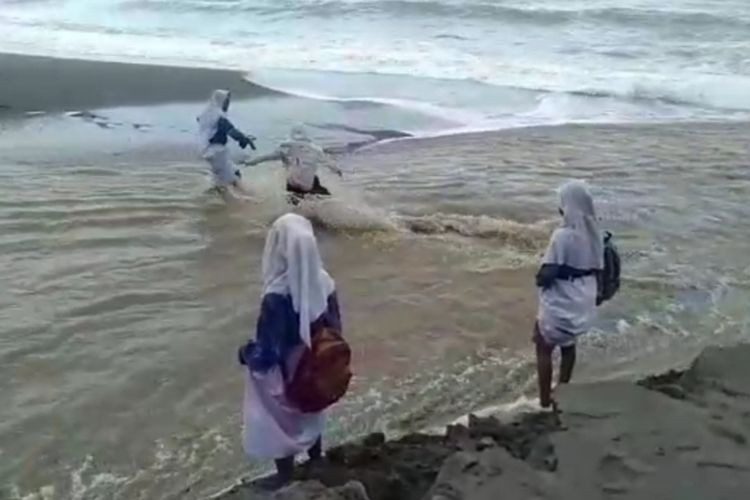Popular Reads
Top Results
Can't find what you're looking for?
View all search resultsPopular Reads
Top Results
Can't find what you're looking for?
View all search resultsIndonesian schools find ways to outsmart outbreak
A Christian elementary school on a remote island of Maluku and a private school in Bandung of West Java are among many teaching institutions that have come up with creative ways to navigate the pandemic.
Change text size
Gift Premium Articles
to Anyone
M
auren Akolo, a sixth-grader on Nuruwe Island of West Seram, Maluku, had a fun time at the beach on Monday since 7 a.m., as the school day was not as strict as usual.
“We spend the whole day at the beach, because we only go to school tomorrow [Tuesday],” said the 11-year old, as quoted by tempo.co, referring to the in-person session for the weekly schedule. Mauren goes to the Christian Elementary School in Nuruwe.
She went on to say that she and her classmates did not have to go to school for months after the pandemic hit the country in March. However, in-person classes resumed in July.
Mauren said students were given tasks for each day during the weekly meetings, which were due to be submitted at the following meeting.
“I usually start to study at home at 6 p.m. In daytime, I play with my friends or sometimes help my mother [prepare meals] in the kitchen,” she added.
Mauren’s school applies shifts for its students. The girl is scheduled to go to school every Tuesday, with classes starting at 8 a.m. and ending at 12 p.m.
The 32 sixth-graders at Mauren’s school are divided into six groups, each with a different schedule for in-person learning. The in-person classes are held at residents’ or teachers’ houses rather than at the school campus.
One of the school’s teachers, Mei Nikolebu, said such an arrangement during the pandemic, especially in a small area with limited communication infrastructure, was most suitable for the islanders. He said big cities had the advantage of online learning due to better communication infrastructure.
“Some parents cannot afford to buy smartphones for [remote learning],” said Mei, adding that most islanders worked as coconut growers, seaweed farmers or fishermen.
“We don’t want to put another burden on them, because they already have limited ability and a lack of access to formal education,” Mei added.
Meanwhile, the Pribadi Bandung private school in Bandung, West Java, has resorted to project-based learning to boost students’ achievements.
The private school has just won in the senior and junior high school categories of the National Science Competition in October and November. In the competition, the school won one gold medal in social science, two silvers in natural science and biology and three bronzes in mathematics, physics and astronomy.
“Winning seven medals is no small feat, because it was all done during the pandemic.
“It was tough for us all to train the students, because the school campus was closed due to the outbreak. Nevertheless, we did our best in virtual sessions to motivate the students for the competition,” said Pribadi Bandung principal Rahmat Hidayat, as quoted by kompas.com. (nkn)
Editor’s note: This article is part of a public campaign by the COVID-19 task force to raise people’s awareness about the pandemic.










